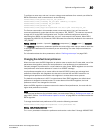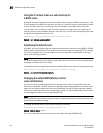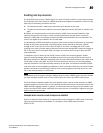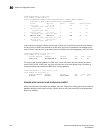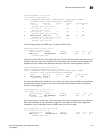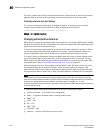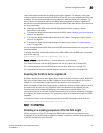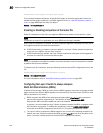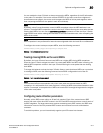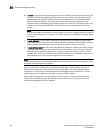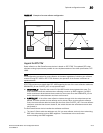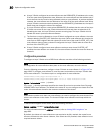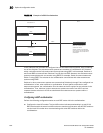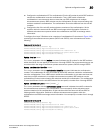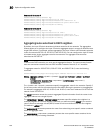
PowerConnect B-Series FCX Configuration Guide 1017
53-1002266-01
Optional configuration tasks
30
You can enable the Layer 3 Switch to always compare the MEDs, regardless of the AS information
in the paths. For example, if the router receives UPDATES for the same route from neighbors in
three autonomous systems, the router would compare the MEDs of all the paths together, rather
than comparing the MEDs for the paths in each AS individually.
NOTE
By default, value 0 (most favorable) is used in MED comparison when the MED attribute is not
present. The default MED comparison results in the Layer 3 Switch favoring the route paths that are
missing their MEDs. You can use the med-missing-as-worst command to make the Layer 3 Switch
regard a BGP route with a missing MED attribute as the least favorable route, when comparing the
MEDs of the routes.
NOTE
MED comparison is not performed for internal routes originated within the local AS or confederation.
To configure the router to always compare MEDs, enter the following command.
PowerConnect(config-bgp-router)#always-compare-med
Syntax: [no] always-compare-med
Treating missing MEDs as the worst MEDs
By default, the Layer 3 Switch favors a lower MED over a higher MED during MED comparison.
Since the Layer 3 Switch assigns the value 0 to a route path MED if the MED value is missing, the
default MED comparison results in the Layer 3 Switch favoring the route paths that are missing
their MEDs.
To change this behavior so that the Layer 3 Switch favors a route that has a MED over a route that
is missing its MED, enter the following command at the BGP4 configuration level of the CLI.
PowerConnect(config-bgp-router)#med-missing-as-worst
Syntax: [no] med-missing-as-worst
NOTE
This command affects route selection only when route paths are selected based on MED
comparison. It is still possible for a route path that is missing its MED to be selected based on other
criteria. For example, a route path with no MED can be selected if its weight is larger than the weights
of the other route paths.
Configuring route reflection parameters
Normally, all the BGP routers within an AS are fully meshed. Each of the routers has an IBGP
session with each of the other BGP routers in the AS. Each IBGP router thus has a route for each of
its IBGP neighbors. For large autonomous systems containing many IBGP routers, the IBGP route
information in each of the fully-meshed IBGP routers can introduce too much administrative
overhead.
To avoid this problem, you can hierarchically organize your IGP routers into clusters:



